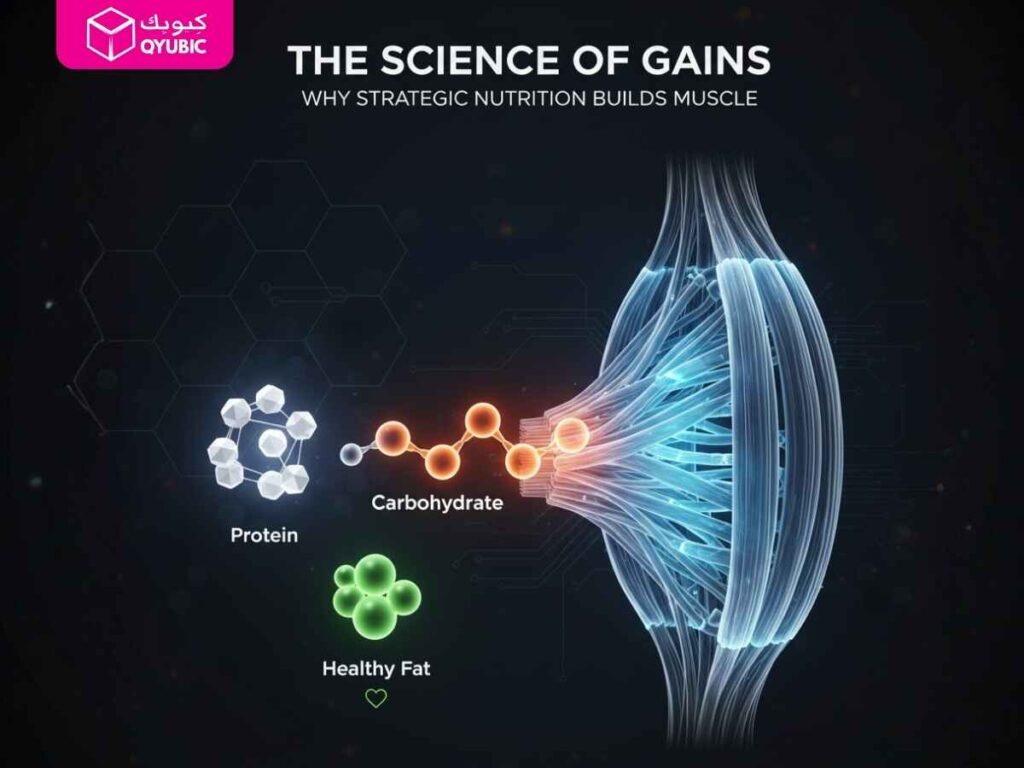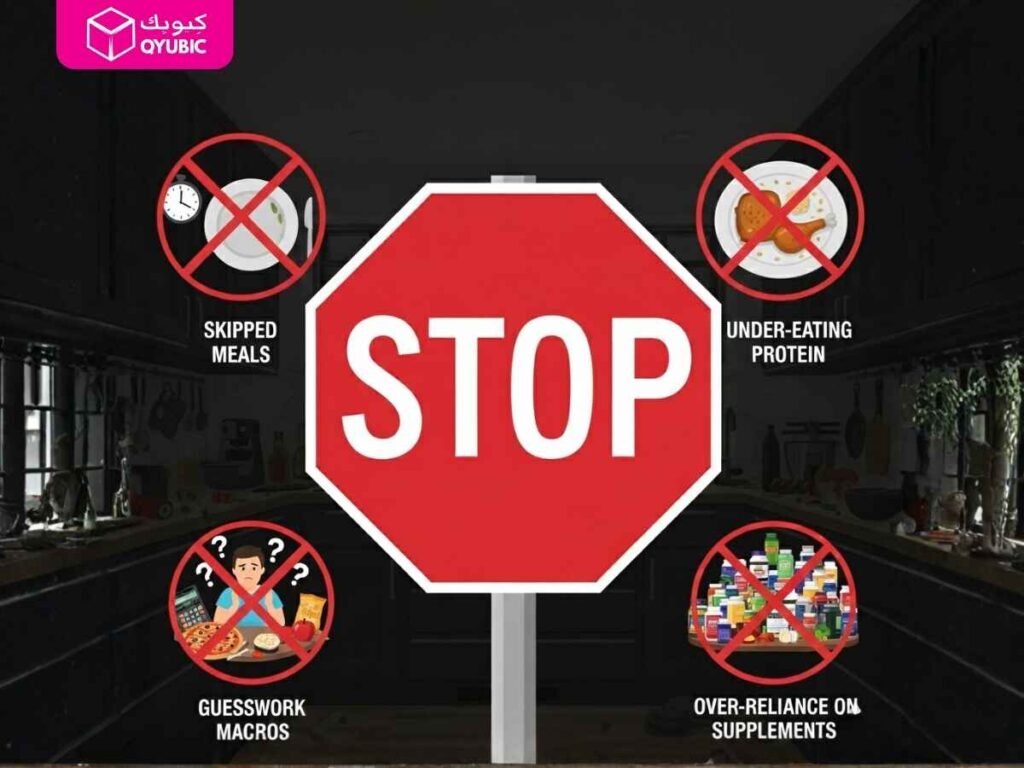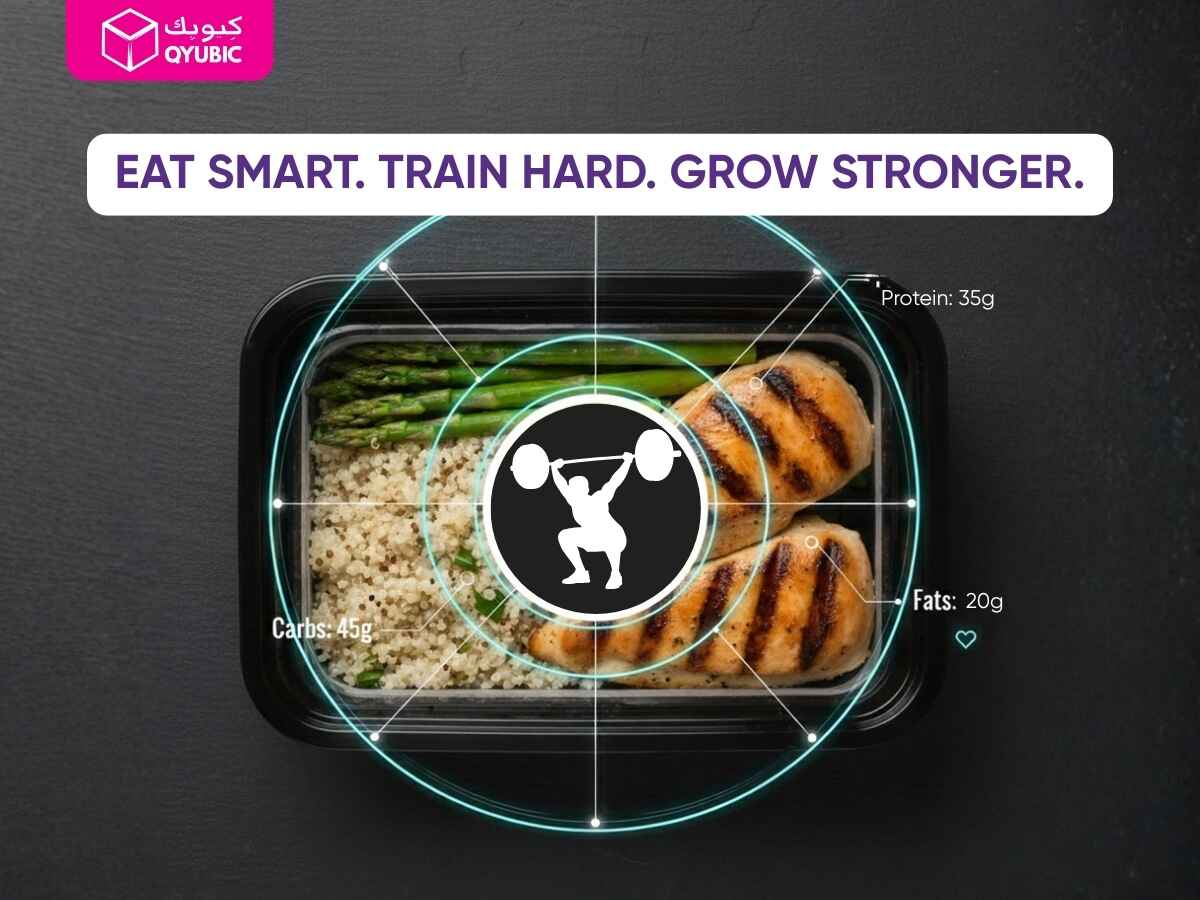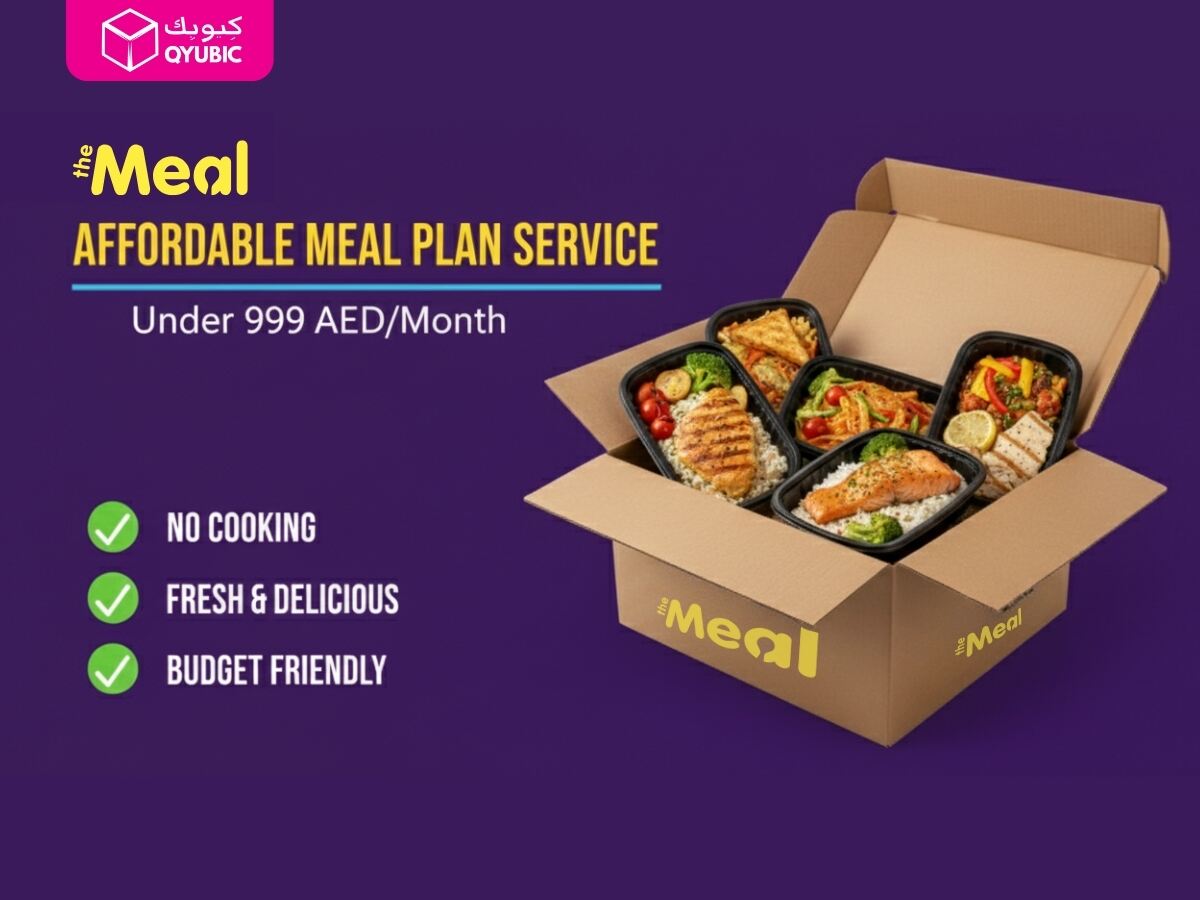Training hard but not seeing the muscle you deserve? You’re not alone — and the problem usually isn’t your workout. It’s what’s on your plate.
Muscle is built from precision nutrition — not random bulking, skipped meals, or post-gym takeout. If you’re not fueling your body right, you’re sabotaging your gains. Every missed gram of protein or every skipped meal is a missed opportunity for growth.
In this guide, we’ll break down the exact science and structure behind effective muscle gain . From how to calculate your ideal macros to building a sustainable gym meal plan that fits your lifestyle. You’ll also learn practical strategies to stay consistent even when you’re short on time, whether that means smart meal prepping or exploring ready-to-eat, high-protein options that keep you on track.
💡Tip: Before you stock up, check out QYUBIC’s exclusive coupons for essential supplements — helping you save more on the high-quality proteins, vitamins, and recovery aids that keep your progress on track.
You’re already showing up at the gym. Let’s make sure your meals — and your nutrition — do the same.
The Science of Gains: Why Strategic Nutrition Builds Muscle

It’s Not Just About Training — It’s What You Feed Your Muscles
Lifting weights breaks down muscle fibers. Nutrition is what builds them back — bigger and stronger.
The key driver behind this process is muscle protein synthesis (MPS) — your body’s way of repairing and growing muscle after resistance training. But here’s the catch: MPS only works when you consistently fuel it with the right nutrients, especially protein.
The Ideal Macro Blueprint for Growth
If you want results, your macros can’t be guesswork. Here’s what science says works best for muscle gain:
- Protein: 1.6–2.2g per kg of body weight daily (e.g., 80kg person = 128–176g)
- Carbohydrates: 4–6g/kg/day for energy, recovery, and performance
- Fats: 0.8–1g/kg/day to support hormones and overall health
🔑 Spread your protein intake: Aim for 30–40g per meal, 3–5 times daily — this keeps MPS active and avoids long catabolic gaps.
Nutrient Timing: When You Eat Matters
You’ve probably heard of the “anabolic window” — and while it’s not as small as once thought, timing still counts.
- Pre-workout: Fuel up with carbs + moderate protein 60–90 minutes before training.
- Post-workout: A protein-rich meal or shake within 1 hour supports recovery and maximizes growth.
- Daily rhythm: Eat every 3–4 hours, focusing on high-quality protein at each meal.
Think of MPS like a construction crew — if the protein “bricks” don’t show up on time, the muscle-building project slows down.
The Downside of Guesswork and Inconsistency
You can’t out-train poor nutrition.
- Skipping meals
- Winging your macros
- Over-relying on supplements
- Inconsistent calorie intake
These all add up to underwhelming results — despite hard work in the gym. Without a reliable nutrition plan, your muscle-building progress will plateau or even reverse.
How the Right Meal Plans for Muscle Gain Transform Your Progress

Smart Calorie Surplus for Your Muscle Gain Meal Plan
To build muscle, you need to eat more than you burn — but more isn’t always better.
The sweet spot? A 10–20% calorie surplus above your maintenance level.
- Beginners & intermediates: Aim for 300–500 extra calories/day (faster gains).
- Advanced lifters: Stick to 150–300 calories/day (slower, leaner gains).
High-Quality Protein in Every Meal
Protein drives muscle growth. But not all protein is created equal.
Aim for 30–40g of high-quality protein per meal, spread across 3–6 meals/day.
Top sources:
- Chicken, lean beef, fish, eggs, Greek yogurt
- Tofu, tempeh, lentils, chickpeas (plant-based)
Each meal should include complete proteins with all 9 essential amino acids.
Carbs That Support Training & Recovery
Carbs aren’t optional — they’re your training fuel.
Resistance training drains muscle glycogen by up to 40%. Without replenishment, your performance drops, and muscle recovery slows.
Consume 3–7g carbs per kg of body weight/day (or ~40–50% of your daily calories).
Best sources:
- Brown rice, oats, quinoa, sweet potatoes, whole fruits
- Whole grain bread, legumes, pasta
Pro Tip 💡 : Strong muscles start with a strong gut ,and taking quality probiotics can help improve digestion, reduce bloating, and maximize how your body absorbs key nutrients from your meals.
Healthy Fats for Hormones & Absorption
Fats are essential for testosterone production, nutrient absorption, and joint health — all key for lifters.
Target 20–30% of daily calories from fat, or 0.8–1g/kg of body weight.
Best sources:
- Avocados, olive oil, nuts, seeds, fatty fish, egg yolks
Don’t go too low on fat — it can crash your hormones and stall recovery.
Incorporate Protein Shakes or Smoothies:
For those busy days or post-workout recovery, protein shakes or smoothies are an ideal supplement to your meals. Simply blend your favorite protein powder with ingredients like bananas, oats, and almond butter for a nutrient-dense snack or meal replacement.
A post-workout protein smoothie or shake can add another 20-40g of protein to your day. Just mix a scoop of high-quality isolate protein powder with a banana, peanut butter, and some oats — a simple, effective way to hit your goals without missing a beat.
Power Your Shake, Boost Your Gains
Get Dymatize ISO 100 Hydrolyzed Whey (Gourmet Vanilla) at DrNutrition.com — the clean, fast-digesting isolate your muscles crave.
Use Qyubic’s DrNutrition exclusive coupon for an extra 10% off today!
Realistic Meal Frequency That Fits Your Lifestyle: A Gym Meal Plan You Can Stick To
Forget strict meal clocks. The best frequency is the one you’ll stick with.
That said, eating every 3–4 hours keeps protein levels steady and energy up.
Most lifters thrive on:
- 3 main meals + 2–3 snacks
- Or 4–6 mini-meals throughout the day
💡 Bonus: Smaller meals can make it easier to hit high calorie targets without feeling stuffed.
Sample Meal Plans for Muscle Gain
You know the macros. You understand the timing. Now it’s time to put it into practice. This flexible, plug-and-play meal framework helps you structure your daily nutrition — whether you’re meal prepping like a pro or grabbing quick bites between work and workouts.
⚖️ First: Adjust Based on Your Body Weight
Your calorie needs aren’t random — they’re largely driven by your size and training intensity.
💡General Calorie Guidelines:
- Smaller individuals (55–68 kg / 120–150 lbs): 2,200–2,600 kcal/day
- Average/active individuals (70–85 kg / 154–187 lbs): 2,500–3,000 kcal/day
- Larger or high-volume trainees (90+ kg / 198+ lbs): 3,000–3,500+ kcal/day
👉 Target weight gain: 0.25–0.5% of your bodyweight per week = clean, steady growth.
📅 A Full-Day Sample Plan (~2,500 kcal)
| Meal | Goal | Example Option |
| Breakfast | High-protein + complex carbs | Oats + scoop of whey + banana + peanut butter or Eggs + toast + avocado |
| Mid-Morning Snack | Bridge the protein gap | Protein shake + appleor Cottage cheese + pear + walnuts |
| Lunch | Balanced plate: protein + carb + veg | Grilled chicken + brown rice + broccoli or Salmon + quinoa + side salad |
| Pre-Workout | Quick-digesting carbs + moderate protein | Protein bar + bananaorGreek yogurt + fruit |
| Dinner | Post-workout recovery fuel | Lean beef + sweet potato + green beans or Chicken quesadilla + black beans |
| Evening Snack | Overnight muscle repair (slow-digesting) | Cottage cheese + almonds or Casein shake + almond butter |
🚫 Common Mistakes That Hinder Muscle Gain

You’re putting 110% in all the workout sessions , staying consistent — but your progress has stalled. More often than not, it’s not your workout… it’s your nutrition. Let’s break down the most common muscle-gain killers — and how to fix them fast.
❌Mistake #1: Not Adding Enough Protein in Your Gym Diet Plan
Problem: Protein is the raw material for muscle. Without enough, your gains stall.
Fix: Aim for 1.6–2.2 g/kg of body weight/day, spread across 3–6 meals.
➡️ Prioritize complete sources: chicken, fish, eggs, Greek yogurt, legumes, tofu.
❌ Mistake #2: Undereating — You’re in a Deficit, Not a Surplus
Problem: If you’re not eating above maintenance, you’re not building. Period.
Fix: Eat in a 10–20% calorie surplus (roughly 300–500 extra kcal/day).
➡️Track intake for a few days to ensure you’re eating enough.
❌ Mistake #3: Avoiding Carbs in Your Meal Plans For Muscle Gain
Problem: Carbs fuel training and recovery. Low-carb = low energy, low output.
Fix: Eat 3–7 g/kg of carbs daily — especially around workouts. Choose complex carbs (oats, rice, quinoa).
❌ Mistake #4: Skipping Meals or Eating Inconsistently
Problem: Long gaps = missed protein windows and muscle breakdown.
Fix: Eat every 3–4 hours. Stick to a structure: 3 main meals + 2 snacks works for most lifters.
❌ Mistake #5: Ignoring Pre- and Post-Workout Nutrition
Problem: This is prime muscle-building real estate — don’t waste it.
Fix:
- Pre-workout: 20–40g protein + 30–50g carbs
- Post-workout: Same again — within 30–60 minutes of finishing
❌ Mistake #6: Under-Hydrating
Problem: Even 1% dehydration reduces strength and recovery.
Fix: Drink 2–4 liters/day — more if you train hard or live in a hot climate.
❌ Mistake #7: Over-relying on Supplements
Problem: Powder ≠ whole food. Relying too much on shakes = nutrient gaps.
Fix: Use supplements as a tool, not a base. Prioritize whole foods.
Fuel Smart, Lift Strong, and Stay Consistent
Building muscle isn’t just about pushing harder in the gym — it’s about fueling smarter outside it. The truth is simple: your growth happens in the kitchen, not under the barbell. When you combine structured training with a consistent, nutrient-dense meal plan for muscle gain, results become inevitable.
Stay mindful of your calorie surplus, hit your daily protein targets, and don’t shy away from using protein shakes or meal prep to stay on track. Every well-balanced meal, every shake, and every recovery-focused choice compounds into the physique you’ve been working for.
So whether you’re starting your first bulk or refining your nutrition to break a plateau — remember: discipline builds habits, and habits build muscle
FAQs: Meal Plans for Muscle Gain — Everything You Need to Know
1. How long does it take to see visible muscle gain with a proper meal plan?
Generally, with consistent training and nutrition, noticeable muscle gain can be seen in 8–12 weeks. Beginners may see faster changes due to “newbie gains,” while experienced lifters progress more slowly but steadily. Tracking weight, body composition, and strength helps measure real progress beyond the mirror.
2. What should I eat before and after a workout for best results?
- Pre-Workout (60–90 min before): A mix of carbs and moderate protein, like oats with whey or chicken with rice, provides energy and amino acids for training.
- Post-Workout (within 30–60 min): Prioritize fast-digesting protein + carbs to jumpstart recovery — a protein shake with a banana or lean meat with rice works great.
3. Do I need supplements if I already eat enough protein-rich meals?
Not necessarily. Whole foods should always come first. However, protein powders and creatine are convenient and scientifically proven tools to help hit your macros — especially when you’re short on time or appetite. Think of them as support, not replacement.
4. How important is sleep for muscle gain and recovery?
Crucial. Sleep drives growth hormone release and protein synthesis. Aim for 7–9 hours per night — even small improvements in sleep quality can boost muscle recovery and energy during training.
5. Is it okay to have cheat meals while following a muscle gain diet plan?
Yes — in moderation. Occasional cheat meals can help with adherence and mental balance, but avoid turning them into cheat days. Try to keep total weekly calories balanced and prioritize nutrient-rich foods even when indulging.
6. What’s the biggest nutrition mistake people make when trying to gain muscle?
The biggest mistake is inconsistency — either skipping meals, underestimating calories, or not tracking progress. Your training might be perfect, but if your nutrition fluctuates, your gains will too. Consistency with your meal timing, macros, and protein intake is what builds lasting results.





